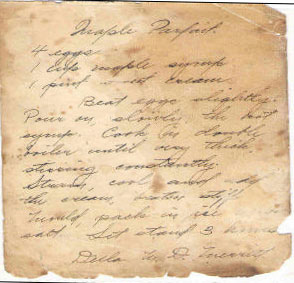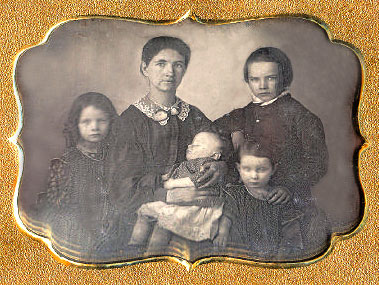There is an intersection in Hartland of the roads Weed and Flower. Now this is a bit different than Maple and Oak as there really were families with the surname of Weed and of Flower. It is the Flower family that we plan to visit today.
“The Flowers came from Hartford, Conn. at the early settlement of the town, in exactly what year is not known. They made their first pitch on what was afterward the Parson Breck farm. (This house is gone but was on the Center of Town Road), subsequently exchanging with someone who desired “improved” land, for the land now (published in 1914) occupied by W.E. Davis . (This house is standing on the left side of Rte 12 as you head west).
Elisha Flower was in Captain Benjamin Wait’s Windsor company of rangers. He was the first settler and built the large two-story house now the home of W.E.Davis.
William Flower, a cousin of Elisha, served in the Revolutionary War as a
Captain’s waiter. He never was regularly enlisted but it is said that Judge Elihu Luce was on the point of securing a pension for him when he died.” ( From “Hartland in the Revolutionary War – with Associated History, written by Dennis Flower and printed on the Solitarian Press ,Hartland, Vermont on December 2, 1914 – price 50c)“Elisha Flower – Rev. War soldier died in 1812 at the age of 55. His daughter,
Elizabeth was 3 when she died in 1796.“Rest here sweet child among the dust
Til Christ shall come and raise the just”Susanna Flower who was 30 when she dies gets this, less than comforting epitaph:
“A heap of dust alone remains of thee’
Tis all thou art and proud shall be”
I find that one of the best ways to get a feel for a person and the times through reading news clips. These are the real stuff, the every day coming and and so I would like to share a few that appeared in our local newspapers. They give you a feel for this ordinary and at the same time, extraordinary family.
1901″ D. Flower and W.E. Jenne built a chimney for J.H. Emerson at the Three Corners Saturday.”
“Florence Flower, who has been working at Dr. Harlows in Windsor since the New Years, is at home with her mother.”
“The Y.P.C.U. will be held next Sunday evening by Lucy M. Flower. This being Prison Sunday, the topic for discussion is “The Social Ideal”
“Mrs. Nellie Flower, one of many who in 1899 were “The committee from the Universalist Society to take entire charge of the food supplies and management of the tables for Memorial Day at the Town Hall ” [This would be the large white building on the left after crossing the intersection in 4 Corners, heading west.]
“Miss Viola Flower of Vershire is visiting her mother, Mrs Nellie Flower.”
1906 “Revs Howard and Don Flower have gone to Indiana and Illinois”
“Frank Miller and Ahira Flower are in Lexington, Mass.”“Our masons, D.Flower and W.E.Jenne, their helpers and assistants, have commenced their spring journeyings to Windsor and Cornish, N.H.. They go and return each day, but have found “Jordon a hard road to travel.”
“Hartlands Revolutionary Soldiers, Dennis Flower and J.F. Colston
recently revisited Hartland’s cemeteries to get the names and dates of the death of the soldiers of the Revolutionary War. The following list was secured.” [From this came Dennis’s publication . What a huge contribution this was to the history of Hartland.]1900 “Don M. Flower, who during the vacation weeks of St. Lawrence University, Canton, N.Y. has been preaching successfully in that state, is home with his parents, Mr. and Mrs. D (Dennis) Flower. He returns in a couple of weeks to the University.”
“Don M. Flower, accompanied by his brother Howard, returned to St. Lawrence University, Canton, N.Y.”
1900 “The brothers, Don M. and Howard J. Flower, reached here by way of White River Jct. Sunday from Canton, N.Y. to attend their sister’s funeral Monday.” [This would be Lucy who died at the young age of 25.]
“D.Flower, who was at work on a sugar arch at Old Watson’s last week Thursday, on going to the barn for his team was met by Mr. Watson’s dog, who decidedly objected to his taking it, giving him a severe bite in the calf of the leg. Dr. Morris, whose heroic treatment in such cases is well known, cauterized the wound, and it is doing as well as is possible. The incident created quite a discussion here, it is said, as to which is the best meat for dogs, mutton or veal. Mr. Marcy, who owns a fine cosset, would rather have a dog bite him than his sheep. “Dan” however, thinks he would rather supply them with mutton, especially if the veal has to be furnished from the calf of his own leg. The opinions of Messrs. Williams and Bagley, who have recently paid a fabulous sum for mutton for their dogs, haven’t been secured at this writing.”
Speaking of dogs, this is from Analdo and Ernest English, written by Howland Atwood.
Ahira Flower and John Barrell were great cronies – also great fox hunters. They had been hunting somewhere and their jug was empty. They came home late at night and having a thirst got Murphy or Durphy ( who lived with them) out to come down to the 4 Corners and get the jugs filled up at the hotel. There was some grumbling from the hotel people at being disturbed at such an hour but he got his 2 jugs filled and headed back up the turnpike. He got up to where there were 2 or 3 trees standing on a hillock near the road and something in one of the trees jumped back and forth and screamed and scared him terribly, but he didn’t drop the jugs and ran home as fast as he could. Flower and Barrell got the dogs and came back and the thing jumped out into the meadow and the dogs took after it. One dog never came back and the other was pretty chewed up.

Across Rte. 12 from the Ladies Aid building is the Flowers brick cape.
Perhaps the most colorful member of the Flower family would be Howard. I am quoting from “ In Sight of Ye Great River”.
The Flower family was eccentric. J. Howard, the patriarch, wore sandals, his hair and beard hanging long and white over a flowing red tie. He prohibited the family from cutting their hair, even the boys wore it long, which caused consternation when the boys had to travel outside Hartland. On the kitchen wall a poem exclaimed:
The men on this mundane sod
That hack the hair all off the head
And call it pretty ‘Oh my God’The Flowers were vegetarians. The eight boys and girls were educated at home until the 5th grade. Fellow children in the village always had to wait until he had read to the children in the evening before they could come out to play.
J. Howard made his living as a poet. He sold his poems and journals door to door. He operated a foot-press, which was hand fed and published “The Free Soul: A Pioneer of Personal Liberation and Eternal Youth, Printed in Our Corner of the Universe at Erratic Intervals of Eternity” —The Flowers were Democrats. — When Cleveland won the Presidency of the Union in 1892, the Flowers fired crackers, sang campaign songs and marched along a few village streets. At that time Hartland as a whole was as Republican as the state of Vermont. However, the Four Corners was a little pocket of Democratic activity.”
The children were all highly intelligent, highly educated and went beyond Four Corners to make their marks in the world.
A Poem by J. Howard Flower
ASCUTNEY over vales that shut
Looks down a few miles yonder;
At east, the blue Connecticut
Draws down Lull Brook to wander
And wind, fulfilled by crystal rills,
Thru Hartland shrined among the hills.Above our heads a high blue dome
Bends round our hills from Heaven;
From wooded banks about our home
We hear at moonlit even
A vesper plaint of whippoorwills
At summer Hartland shrined in hills.
Thru open doors of morning’
The matin of the Bobolink
Hails dandelions adorning
The meadows of the morn and trills
At summer Hartland shrined in hills.
Midst Christmas snows, tho mercury goes
Below to ten or twenty,
Still in our households summer glows;
And homelike hearts wish plenty
Of cheer and all the good you want
From winter Hartland in Vermont.
Reprinted from the June 2007 Hartland Historical Society Newsletter.


